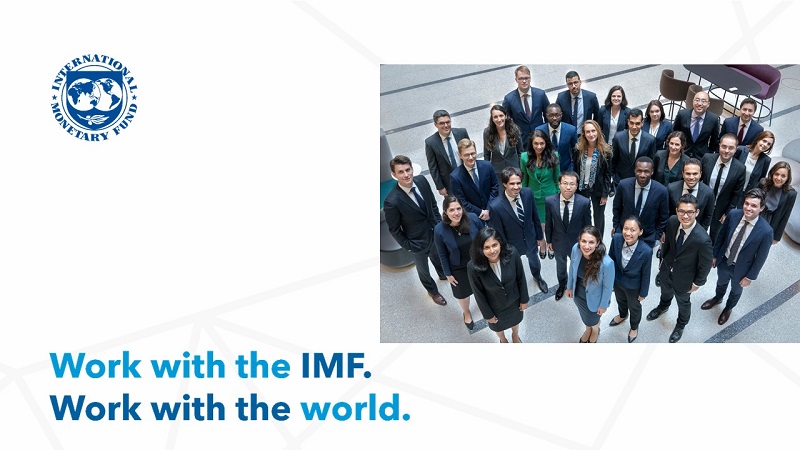Deadline: December 5, 2024
Applications are open for the International Monetary Fund (IMF) Economist Program 2024-2025. Joining the IMF as part of their Economist Program (EP), will jump-start your career by giving you hands-on exposure to a cross-section of IMF work and an opportunity to apply your research and analytical skills directly to essential policy work which impacts our 190 member countries.
They are looking for young economists who want to have influence on the global stage and who can bring the latest in economic thought and multidisciplinary approaches to help them address key global economic challenges, such as fostering global monetary cooperation, securing financial stability, boosting international trade, promoting employment and sustainable economic growth, and reducing poverty.
Program Details
The EP offers you a well-rounded experience of the IMF’s work and provides a unique foundation for a thought-provoking and fulfilling career as an economist. During the three-year program, you will rotate through two departmental assignments, joining economic teams working in regional and country-specific surveillance as well as in fiscal, monetary, balance of payments, debt, or related issues. This is not a trainee position and from the start you will be given real work and real responsibilities as an IMF economist. This could include policy development, country or regional operational work, research, and capacity development and teaching.
By the end of the program, the IMF hopes you will be as excited by their work as they are and will choose to remain and build a long-term career as an IMF economist.
Eligibility
They are seeking top economists from around the world who:
- Have recently completed or are expected to complete your PhD within a year (or less) of joining the IMF, in fields including macroeconomics, finance, public finance, monetary economics, international economics, trade, poverty issues, macro-climate, political economy, econometrics or related areas.
- Are able to demonstrate a sound understanding of macroeconomics (even if specialized in other areas during graduate school) and use conceptual frameworks to explain complex ideas, navigate around the different sectors of an economy and highlight the linkages between these sectors.
- Possess an excellent academic record.
- Have proven analytical, quantitative, and IT skills.
- Are a national of one the IMF member countries.
- Will be below age 34 at entry to the program on September 8, 2025.
- Have strong written and oral English skills.
You should also be:
- Motivated by contributing to the economic well-being of our members.
- Interest in, with aptitude for, working in an international environment, and making a difference to global economic policy issues that impact the lives of people around the world.
- Willing to undertake a combination of operational, analytical, and research work.
- Versatile and flexible in learning about different areas while also possessing a strong field of relevant expertise.
- A natural collaborator motivated by exchanging information and ideas to reach common goals.
- Culturally agile with the emotional intelligence to engage effectively internally and externally, develop relationships, and build strong networks across and within teams.
- Willing to travel (varies based on assignment but typically one-two missions per 18-month EP assignment).
- Proficient in, or be willing to learn, foreign languages. (Languages other than English are useful but not a requirement.)
Application
Shortlisted candidates will be interviewed between October and January, with offers made in early February. The selection process consists of multiple stages, which may run in parallel to one another.
Below is a summary of the four key stages:
- If your application is shortlisted, you will be invited to a 30-40-minute preliminary interview during which you will be asked for a high-level overview of your research paper and to respond to questions on economic topics related to the work of the IMF and on your interpersonal and communication skills. Dates for IMF campus visits will be added here.
- Following the preliminary interview, you may be asked to forward your most recent university transcript from your PhD program, provide three academic references (references cannot be from current IMF staff members) and submit a research paper (ideally of publishable standard) or one or two chapters of your dissertation.
- Successful candidates this year will be invited for an in-person panel interview comprised of two or three senior IMF economists and a Human Resources officer. The interview will follow a similar format to the preliminary interview, focusing on your knowledge of monetary, fiscal, balance of payments, and financial sector issues and your behavioral skills, to provide a deeper assessment of your analytical abilities, judgment, oral communication and interpersonal skills, knowledge of macroeconomics and related fields, and ability to convey complex issues in a logical and structured way. In addition to the panel interview, you will also be asked to take a 40-minute online psychometric assessment and a 90-minute written exam. The psychometric assessment is designed to identify preferred behavioral skills and approaches, while the written exam will assess your writing skills.
- Once the panel interviews have been completed (normally by late January), all candidates who reached the panel interview stage will be referred to an internal committee of senior staff for review and this committee will make the final selection. The committee will review all seven assessments (bolded above) with the highest weighting given to the panel interview and the research paper review.
For more information, visit IMF Economist Program.

